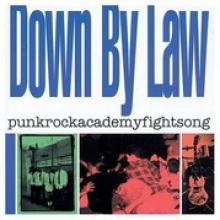The second wave of DC punk affiliated groups – by this time, it was incontrovertible that there was as much pop and straight rock influence as to begin a disassociation with hardcore proper – didn’t necessarily fair too well. Off course after Ian MacKaye figured out the Fugazi formula, his band would go on to international fame, but there weren’t too many other success acts from the ear. Nation of Ulysses garnered a bit of attention and so did Dag Nasty. That latter group, though, went through a few singers and didn’t really settle on a sound over the group’s first few albums.
In part, Dag Nasty’s lot in life can be attributed to original singer, Dave Smalley, leaving after the group issued its first album in order to form Down By Law.
Though neither band can be considered a hardcore group, there remained the stench of the DC scene. And while Fugazi worked to include a vast amount of pacing and approaches to hard rock and punk resulting in critical acclaim, Down By Law wouldn’t be as lucky.
Even as the Smalley fronted ensemble landed a record deal with California’s Epitaph Records and would record three albums for the imprint between 1991 and 1994, the band couldn’t wrangle the same confluence of critical and scene success as groups from DC that preceded it – again, that’s a specific reference to Fugazi.
Perhaps looking towards MacKaye, Smalley sought to take melodicism to hitherto untold places in aggressive music. And while a good portion of the songs that he wrote over Down By Law’s first two albums – the self titled 1991 disc and 1992’s punkrockacademyfightsong – possessed a helping of pop sucrose, there’s a bit too much of a traditional rock bent, even as the group’s second disc comes off a bit better than its debut.
The self titled effort, which included the ridiculous pop-metal guitar solo of “The One” and Smalley’s schmaltzy crooning on “American Dream,” obviously did enough for Down By Law as to warrant another long player. And while punkrockacademyfightsong is undoubtedly a step forward for the ensemble, there’re still a few problematic passages.
While it maintains an aggressive bent and a decent breakdown, “1994” finds the band moving into radio-ready, popular styles. Listeners might be hesitant to levy the term alternative on the track, but it’s not a far cry from what he media was up in arms about at the time. By contrast, “Sam I” and “Sam II” were so detached from polished pop stuff that the group should be applauded for including the fast paced flubs on its disc as a joke. “Haircut” is a more successful effort in the same vein with Smalley (oddly) directly criticizing the Seattle thing as he quotes Minor Threat by saying “I don’t wanna hear it.”
The disc winds up being a reflection and a rejection of then popular musics both on the radio and in subterranean circles. Down By Law would soldier on into the next millennium even as the glut of indie bands from the era would basically disallow it a chance at stardom.
